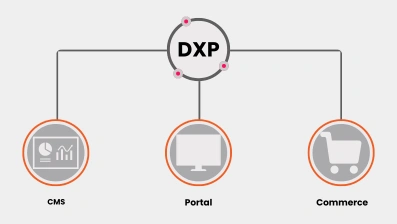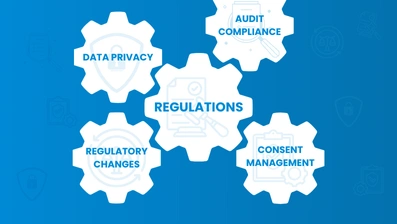In today's digital-first world, delivering seamless and engaging customer experiences is crucial for business success.
A digital experience platform (DXP) plays a vital role in achieving this by integrating various tools and technologies to manage and optimize customer interactions across multiple channels.
As businesses strive to stay competitive, understanding how to choose the right DXP becomes essential.
This blog will guide you through the process, highlighting key considerations and steps to help you make an informed decision.
Whether you are looking to find or select a digital experience platform, this guide will provide valuable insights to streamline your decision-making process.
Why Choosing the Right DXP is Important?
Choosing the right digital experience platform (DXP) is crucial for businesses aiming to deliver consistent, personalized, and engaging customer experiences.
A well-selected DXP can significantly impact customer satisfaction, brand loyalty, and overall business performance.
Here are some key reasons why finding the right DXP is essential:
Enhanced Customer Engagement
A suitable DXP enables businesses to create personalized experiences for each customer.
By leveraging data analytics and customer insights, the platform helps deliver relevant content and offers across various touchpoints.
This personalized approach fosters deeper customer engagement and improves conversion rates.
Seamless Integration
The right DXP integrates seamlessly with existing systems such as CRM, ERP, and marketing automation tools.
This ensures that all customer data is centralized and accessible, allowing for a unified view of customer interactions.
Integration capabilities also streamline workflows and enhance operational efficiency.
Scalability and Flexibility
As businesses grow, their digital needs evolve.
A scalable and flexible DXP can adapt to changing requirements, whether it's handling increased traffic, supporting new digital channels, or integrating with emerging technologies.
This scalability ensures that the platform can grow alongside the business without requiring significant overhauls.
Data-Driven Decision Making
A powerful DXP provides robust analytics and reporting tools, enabling businesses to track and measure the effectiveness of their digital strategies.
By analyzing user behavior, content performance, and conversion metrics, businesses can make data-driven decisions to optimize their digital experiences continuously.
Cost Efficiency
Selecting the right DXP can lead to significant cost savings in the long run.
A well-integrated platform reduces the need for multiple point solutions, minimizing software and maintenance costs.
Additionally, streamlined workflows and improved efficiency can lower operational expenses.
Also Read: Kentico Development Cost
Competitive Advantage
In a highly competitive market, delivering superior digital experiences can set a business apart from its competitors.
A well-chosen DXP enables businesses to stay ahead by offering innovative and engaging customer interactions.
This competitive edge can drive brand loyalty and market share growth.
Security and Compliance
Ensuring the security of customer data is paramount.
The right DXP includes advanced security features and compliance with industry standards, protecting sensitive information and building customer trust.
This is particularly important for industries with stringent regulatory requirements.
Future-Proofing Your Digital Strategy
With the rapid pace of technological advancements, businesses need a DXP that can support future innovations.
A forward-thinking platform provides the flexibility to integrate new technologies and adapt to evolving market trends, ensuring that the business remains at the forefront of digital transformation.
By understanding the importance of choosing the right DXP, businesses can make informed decisions that align with their strategic goals and enhance their digital presence. Next, we will explore the detailed steps to select a digital experience platform that fits your specific needs and objectives.
Steps to Select the Right DXP
Selecting the right digital experience platform (DXP) requires a detailed and methodical approach.
Here are comprehensive steps to help you find the best digital experience platform for your business needs:
Step 1: Assess Your Business Requirements
Identify Key Objectives:
- Determine the primary goals you want to achieve with a DXP, such as improving customer engagement, streamlining operations, or enhancing data analytics.
- Consider both short-term and long-term objectives to ensure the platform can grow with your business.
Evaluate Existing Systems:
- Analyze your current digital ecosystem, including CRM, ERP, and CMS platforms.
- Identify gaps and integration needs to ensure the DXP will seamlessly fit into your existing infrastructure.
Define Content and Marketing Needs:
- Assess the volume and types of content you need to manage, including text, images, videos, and interactive content.
- Determine the marketing capabilities required, such as campaign management, email marketing, and social media integration.
Step 2: Understand Your Audience
Customer Journey Mapping:
- Map out the customer journey to identify key touchpoints and interactions.
- Understand where and how customers engage with your brand across different channels.
Personalization Needs:
- Determine the level of personalization required to deliver tailored experiences.
- Consider how the DXP can leverage data to create personalized content and offers.
Segmentation and Targeting:
- Assess the need for audience segmentation and targeting capabilities to deliver relevant content to different user groups.
- Ensure the platform supports dynamic content delivery based on user behavior and preferences.
Step 3: Define Key Features and Capabilities
Content Management:
- Ensure the DXP offers robust content management capabilities, including content creation, editing, and publishing tools.
- Look for features like version control, workflows, and multilingual support.
Marketing Automation:
- Evaluate the platform's marketing automation tools, such as email marketing, social media integration, and campaign management.
- Ensure it supports advanced features like A/B testing and segmentation.
Analytics and Reporting:
- Assess the DXP's analytics and reporting capabilities to ensure you can track and measure performance effectively.
- Look for real-time data visualization, customizable dashboards, and integration with third-party analytics tools.
Integration Capabilities:
- Ensure the DXP can integrate with your existing systems, including CRM, ERP, and other marketing tools.
- Check for API availability and the ease of integrating with other platforms.
E-commerce Support:
- If applicable, evaluate the DXP’s ability to support e-commerce functionalities such as product management, secure payment processing, and personalized shopping experiences.
Step 4: Evaluate Scalability and Flexibility
Growth Potential:
- Choose a DXP that can scale with your business as it grows.
- Ensure it can handle increased traffic, additional content, and new digital channels.
Customization Options:
- Determine the level of customization required to meet your specific business needs.
- Evaluate how easily the platform can be customized and whether it supports custom development.
Omnichannel Delivery:
- Ensure the DXP supports omnichannel content delivery to provide a seamless customer experience across web, mobile, social media, and other channels.
Step 5: Consider User Experience
Ease of Use:
- Ensure the platform is user-friendly and intuitive for both technical and non-technical users.
- Look for features like drag-and-drop interfaces and customizable templates.
Training and Support:
- Evaluate the training and support options available from the DXP vendor.
- Ensure there are adequate resources, such as documentation, tutorials, and customer support, to assist your team.
Collaboration Features:
- Assess the platform’s ability to support collaboration among different teams, including content creators, marketers, and developers.
- Look for features such as role-based access, approval workflows, and real-time editing.
Step 6: Assess Security and Compliance
Data Protection:
- Ensure the DXP provides robust security features, including data encryption, user authentication, and access controls.
- Verify that the platform complies with industry standards and regulations relevant to your business.
Compliance:
- Check if the DXP supports compliance with regulations such as GDPR, HIPAA, or PCI DSS.
- Ensure the platform can handle data privacy and security requirements.
Backup and Recovery:
- Evaluate the platform’s backup and recovery capabilities to protect against data loss and ensure business continuity.
Step 7: Compare Pricing and Total Cost of Ownership
Licensing and Subscription Models:
- Evaluate the pricing structure of the DXP, including licensing fees, subscription costs, and any additional charges for features or integrations.
- Consider the total cost of ownership, including implementation, maintenance, and support costs.
Return on Investment (ROI):
- Assess the potential ROI by considering the benefits and efficiencies the DXP will bring to your business.
- Ensure the investment aligns with your budget and delivers long-term value.
Cost Components:
- Break down the cost components, including initial setup, training, customization, and ongoing operational costs.
Step 8: Review Vendor Reputation and References
Vendor Experience:
- Research the DXP vendor's experience and expertise in the industry.
- Look for case studies, client testimonials, and reviews to gauge customer satisfaction.
References and Demos:
- Request references from the vendor and reach out to existing customers to understand their experiences.
- Schedule demos to see the platform in action and assess its capabilities firsthand.
Support and Community:
- Evaluate the vendor’s support infrastructure, including availability of customer support, community forums, and regular updates.
By following these detailed steps, you can confidently choose a digital experience platform that aligns with your business goals, enhances customer engagement, and drives digital transformation.
Should You Customize Your DXP?
Customizing your digital experience platform (DXP) can offer significant advantages tailored to your specific business needs.
However, it's essential to weigh these benefits against potential challenges to make an informed decision.
Here’s a comprehensive look at whether you should customize your DXP:
Benefits of Customizing Your DXP
Tailored User Experience
Customization allows you to design a user interface that aligns perfectly with your brand and user preferences. This ensures that the platform meets the specific needs of your audience, enhancing user satisfaction and engagement.
- Brand Alignment: A customized DXP ensures that every element of your user interface reflects your brand identity, from color schemes to user interactions. This cohesive branding can significantly enhance user trust and loyalty.
- User Preferences: Tailoring the user experience to your audience's specific needs and behaviors can lead to higher engagement and conversion rates. Personalized interfaces and functionalities can make interactions more intuitive and enjoyable.
Enhanced Functionality
Custom features can be developed to address unique business requirements that standard DXP functionalities may not cover. This can include advanced analytics, specific marketing tools, or custom e-commerce features tailored to your operations.
- Advanced Analytics: Customizing your DXP to include advanced analytics capabilities allows for deeper insights into user behavior, campaign performance, and content effectiveness. These insights can drive more informed decision-making.
- Marketing Tools: Custom marketing tools can be developed to fit your specific strategies, such as unique segmentation criteria, personalized campaign workflows, and bespoke automation rules.
- E-commerce Features: For businesses with unique e-commerce needs, customization can provide tailored product management, checkout processes, and personalized shopping experiences.
Competitive Advantage
A customized DXP can provide features and capabilities that set you apart from competitors. Unique functionalities and a distinctive user experience can attract and retain customers, driving business growth.
- Unique Functionalities: By developing features that competitors lack, you can offer a more compelling proposition to your customers. This can include innovative content delivery methods, unique personalization strategies, or superior user interfaces.
- Customer Retention: A DXP that perfectly meets user needs and exceeds their expectations can foster stronger customer loyalty, reducing churn and increasing lifetime value.
Better Integration
Customization allows for seamless integration with existing systems, such as CRM, ERP, and other third-party tools. This ensures a unified digital ecosystem, improving data flow and operational efficiency.
- Unified Ecosystem: Custom integration ensures that all your digital tools work together seamlessly, providing a holistic view of customer interactions and streamlining operations.
- Operational Efficiency: Improved data flow between systems reduces manual data entry and errors, leading to more efficient processes and better data accuracy.
Scalability and Flexibility
Custom solutions can be designed to scale with your business, accommodating future growth and evolving needs. You can add or modify features as your business landscape changes, ensuring long-term adaptability.
- Future Growth: A scalable DXP can handle increased traffic, content, and new digital channels as your business grows, ensuring continuous performance and user satisfaction.
- Evolving Needs: As market trends and user expectations change, a flexible DXP allows you to quickly adapt by adding new features or modifying existing ones without significant overhauls.
Challenges of Customizing Your DXP
Higher Initial Costs
Custom development can be expensive, requiring significant investment upfront for design, development, and implementation. It’s essential to budget for these costs and ensure they align with your financial resources.
- Development Costs: Custom features and integrations often require specialized skills, leading to higher development costs. Detailed planning and budgeting are crucial to manage these expenses.
- Implementation Costs: Beyond development, implementation costs include testing, deployment, and initial training, which can add up quickly.
Longer Implementation Time
Customizing a DXP typically takes more time than using out-of-the-box solutions. Delays in deployment can affect your go-to-market strategy and overall digital transformation timeline.
- Project Timeline: Custom projects require detailed planning, iterative development, and extensive testing, which can extend the timeline significantly.
- Market Impact: Delays in deployment can impact your ability to launch new features or campaigns, potentially affecting revenue and market positioning.
Maintenance and Updates
Custom solutions require ongoing maintenance and updates to ensure they remain functional and secure. This can incur additional costs and resource allocation over time.
- Ongoing Support: Regular updates, bug fixes, and security patches are necessary to maintain the integrity and performance of your custom DXP.
- Resource Allocation: Continuous maintenance requires dedicated resources, either in-house or through a reliable partner, to manage these tasks effectively.
Dependency on Developers
Custom development often creates a dependency on specific developers or development teams for ongoing support and modifications. It’s crucial to have reliable partners or in-house expertise to manage these dependencies effectively.
- Technical Expertise: Maintaining a custom DXP requires technical expertise to handle updates, troubleshoot issues, and implement new features. Ensuring access to skilled developers is vital.
- Vendor Dependence: Relying on external vendors for support can lead to delays and higher costs if not managed properly.
Complexity and Risk
Customization increases the complexity of the DXP, which can introduce risks if not managed properly. Thorough testing and quality assurance are essential to mitigate these risks and ensure smooth operation.
- Testing Requirements: Custom solutions require comprehensive testing to identify and resolve potential issues before deployment. This includes functional, performance, and security testing.
- Risk Management: Managing the increased complexity involves careful planning, risk assessment, and mitigation strategies to prevent disruptions.
When to Customize Your DXP
Specific Business Needs
If your business has unique requirements that cannot be met by standard DXP functionalities, customization is a viable option. This is common in industries with specific regulatory needs, complex workflows, or specialized marketing strategies.
- Regulatory Compliance: Industries with strict regulatory requirements may need custom features to ensure compliance with data protection, privacy, and industry standards.
- Complex Workflows: Businesses with intricate workflows may require custom automation and process management features to streamline operations.
Brand Differentiation
Businesses aiming to create a distinctive brand presence may benefit from a customized user experience and unique features. This approach is ideal for companies in highly competitive markets seeking to stand out.
- Unique Brand Experience: Customizing the user interface and experience can help establish a strong brand identity and differentiate your offerings from competitors.
- Market Positioning: Unique functionalities can attract a niche audience, enhancing your market position and driving customer loyalty.
Long-Term Strategy
If your long-term strategy involves significant growth, innovation, and differentiation, investing in customization can provide lasting value. Custom solutions can be designed to evolve with your business, supporting ongoing digital transformation efforts.
- Innovation and Growth: Custom features can support innovative strategies and new business models, ensuring your DXP adapts to future trends and opportunities.
- Sustained Value: Investing in a custom DXP can provide long-term benefits by continuously meeting evolving business needs and customer expectations.
Integration Requirements
If seamless integration with existing systems is critical, customization ensures that the DXP fits perfectly within your digital ecosystem. This is particularly important for businesses with complex data flows and multiple integrated tools.
- Seamless Integration: Custom APIs and connectors ensure smooth data exchange between the DXP and other systems, enhancing overall efficiency and data accuracy.
- Holistic View: Integration with CRM, ERP, and other tools provides a comprehensive view of customer interactions, supporting better decision-making and personalized experiences.
By carefully considering the benefits and challenges of customization, you can make an informed decision on whether to customize your DXP.
DotStark, Your Partner in DXP Customization
At DotStark, we specialize in delivering tailored solutions to meet your unique digital experience needs.
As a leading Kentico development company, , we offer comprehensive services to customize your DXP, ensuring it aligns perfectly with your business goals.
Our expert team provides end-to-end support, from initial consultation and requirements gathering to development, integration, and ongoing maintenance.
We focus on creating a scalable, flexible platform that enhances user experience, streamlines operations, and drives business growth.
Partner with DotStark to leverage the full potential of a customized DXP and stay ahead in the competitive digital landscape.
Contact us today to start your journey toward a superior digital experience.
Conclusion
Selecting the right digital experience platform (DXP) is a critical decision that can significantly impact your business's ability to deliver engaging, personalized customer experiences.
By understanding your business requirements, evaluating key features, considering scalability, and weighing the benefits and challenges of customization, you can make an informed choice that aligns with your strategic goals.
A well-chosen DXP not only enhances customer engagement but also streamlines operations and supports future growth.
Whether you opt for standard functionalities or a customized solution, the right DXP will be a powerful tool in your digital transformation journey.
Frequently Asked Questions
A DXP is a comprehensive suite of tools and technologies designed to manage, deliver, and optimize digital customer experiences across various channels, including websites, mobile apps, and social media.
Choosing the right DXP is crucial for enhancing customer engagement, ensuring seamless integration with existing systems, supporting scalability, and providing robust analytics and security features.
Assess your business requirements by identifying key objectives, evaluating existing systems, and understanding your audience's needs. This helps in selecting a DXP that aligns with your goals.
Key features include robust content management, marketing automation, advanced analytics, seamless integration capabilities, e-commerce support, and strong security measures.
Customization can offer tailored user experiences, enhanced functionality, and better integration with existing systems. However, it also involves higher initial costs, longer implementation times, and ongoing maintenance.
Challenges include higher costs, longer implementation time, increased complexity, dependency on developers, and ongoing maintenance requirements.
Evaluate scalability by ensuring the DXP can handle increased traffic, additional content, and new digital channels. Check if it supports customization and flexible deployment options.
Integration with existing systems ensures a unified digital ecosystem, improving data flow, operational efficiency, and providing a holistic view of customer interactions.
Compare pricing by evaluating licensing and subscription models, considering the total cost of ownership, and assessing the potential return on investment (ROI).
DotStark, a leading Kentico development company, offers end-to-end services to customize your DXP, ensuring it meets your unique business needs and enhances your digital strategy.











 +91 9680599916
+91 9680599916
 vanshika@dotstark.com
vanshika@dotstark.com
